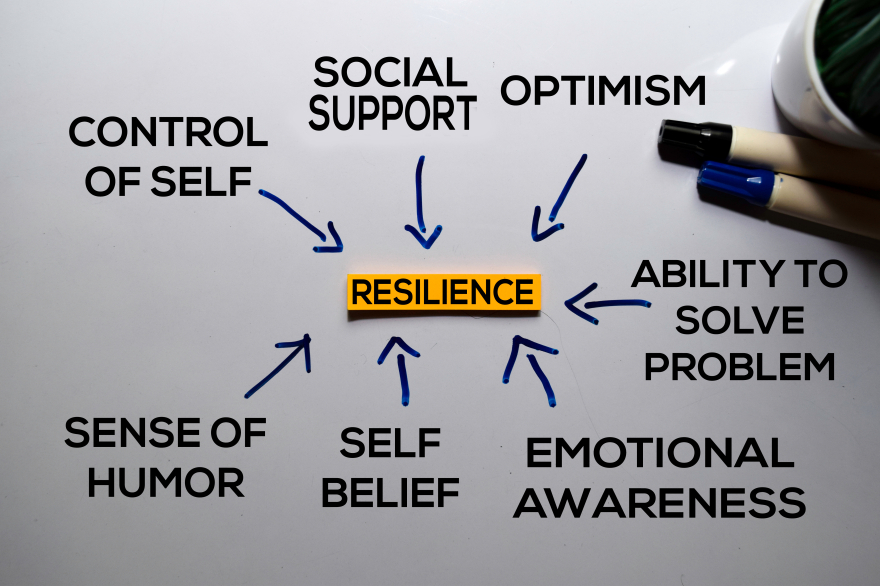PERSONAL NOTE
Well, it's October and I feel like I was just welcoming in 2022. There has been so much going on in the world this year that picking the topic of resilience and bouncing back seemed appropriate. Merriam Webster defines resilience as "an ability to recover from or adjust easily to misfortune or change". After the devastation of Hurricane Ian and the loss of life, resilience is just one of the character traits those folks will need and I hope that we will all find a way to support them during the coming months. The resilience we will be exploring this month is about small or big things, not the extremes that the people of Florida are experiencing. So, let's look at some characteristics that can fortify your resilience.
ARTICLE

Bouncing Back: Developing Emotional Resilience by Jan Cerasaro
Major disruptions are an upheaval we all experience at one time or another in our lives. You get fired, laid off, or passed over; a loved one dies, leaves, or gets in trouble; there is an earthquake, hurricane, or another natural disaster where you live. The list, unfortunately, is endless.
For some, the impact of these hard times is overwhelming. Recovery, if it comes at all, can be painfully slow especially due to natural disasters. Others show resilience and are admirably able to glide through these times fairly easily, bouncing back quickly to a normal life. Resilience—the strength required to adapt to change—acts as our internal compass so we can resourcefully navigate an upheaval.
When unexpected events turn life upside down, it’s the degree to which our resiliency comes into play that makes these “make-or-break” situations an opportunity for growth. The good news is that each of us has the capacity to reorganize our life after a disruption and achieve new levels of strength and meaningfulness. Though it’s understandable to feel vulnerable in the midst of chaos and uncertainty, life disruptions are not necessarily a bad thing because they help us grow and meet future challenges in our lives. You will often hear about couples or families that develop a stronger bond after recovering from adversity.
*******************************
So how can you become more resilient? Here’s a look at 7 key characteristics of people who demonstrate resilience during life’s twists and turns.
1. OPTIMISM--A Sense of Hope and Trust in the World
Resilient people rely on their belief in the basic goodness of the world and trust that things will turn out all right in the end. This positive attitude allows them to weather times when everything seems bleak and to look for and accept the support that is out there. This approach to the world gives them the ability to hope for a better future.
2. CONTROL OF SELF--Able to Interpret Experiences in a New Light
The ability to look at a situation in a new way (a skill called “reframing”) can minimize the impact of a difficult situation. Resilient people take a creative approach to solving a problem and don’t always use an old definition for a new challenge.
3. SOCIAL SUPPORT--Meaningful System of Support
One of the best ways to endure a crisis is to have the support of another person who can listen and validate your feelings. Knowing that others care and will come to our support decreases the feeling of isolation, especially when tackling a problem alone. It’s important to choose people you trust. Don’t be surprised if it takes several friends, each of whom can provide different kinds of support. Resilient people aren’t stoic loners. They know the value of expressing their fears and frustrations, as well as receiving support, coaching, or guidance from friends, family, or a professional.
4. ABILITY TO SOLVE THE PROBLEM--A Sense of Mastery and Control Over Your Destiny
You may not be able to predict the future, but you can tackle a problem instead of feeling at the mercy of forces outside of your control. Resilient people know that ultimately their survival and the integrity of their life values depend on their ability to take action rather than remain passive. Tough times call for you to tap into your own sense of personal responsibility.
5. EMOTIONAL AWARENESS--Self-Reflection and Insight
Life experiences provide fertile ground for learning. Asking yourself questions that invite introspection can open a door to new understanding and appreciation of who you are and what you stand for. Giving voice to decisions made in the past.
6. SELF BELIEF
People who show resilience in the face of adversity are those who remember challenges from the past that they were able to overcome. They know that they can draw on things they have done before, life lessons they have learned, and strategies that have worked for them in the past. This gives them the confidence to know that they can handle whatever arises.
7. SENSE OF HUMOR
Have you ever started to laugh during a difficult situation? The ability to see the absurdity, irony or genuine humor in a situation stimulates our sense of hope and possibility. Humor has both psychological and physical benefits in relieving stress because it encourages a swift change in your perception of your circumstances—and when your thoughts change, your mood follows.
If you improve these seven areas now—rather than wait for adversity—you’ll be able to bounce back more quickly.
 COOL RESOURCE COOL RESOURCE
Let's not forget that our children need to navigate this world and learn how to build resilience so I have included references for 2 books for kids that you can get on Amazon.
The Resilience Workbook for Kids: Fun CBT Activities to Help You Bounce Back from Stress and Grow from Challenges by Caren Baruch-Feldman, Ph.D., Rebecca Comizio, MA, MEd, et al--April 1, 2022 (For ages 7 to 12)
and
Building Resilient Students From the Inside Out: 5 Proven Ways to Help Students Build Self-Efficacy and Resilience Paperback-Aug, 17, 2018 by JC Pohl and Ryan McKernan
EVENTS
I will be at the California Escrow Association Annual Conference in Los Angeles on October 21 and 22nd. I will be the speaker for the San Diego County Escrow Association November meeting on November 15th (via Zoom) topic is to be announced next month (it's a secret).
CONNECT WITH ME
Linked In
Please let me know if there are particular items you would like me to cover in upcoming newsletters. Just email me at jancerasaro@yccbe.com
Stay safe, healthy, and happy!
Coach Jan
|